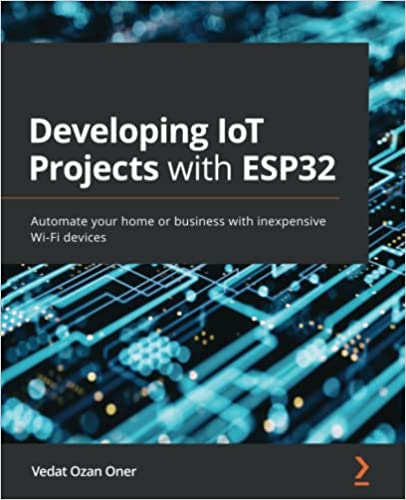Vedat is the author of Developing IoT Projects with ESP32, we got the chance to sit down with him and find out more about his experience of writing with Packt.
Q: What is/are your specialist tech area(s)?
Vedat: Software development, Internet-of-Things
Q: How did you become an author for Packt? Tell us about your journey. What was your motivation for writing this book?
Vedat: Packt contacted me asking if I’d like to write a book about ESP32, and I happily accepted. I was planning about writing a book with a different subject actually, but ESP32 was one of my specialties so I decided it was a good opportunity.
Q: What kind of research did you do, and how long did you spend researching before beginning the book?
Vedat: After agreeing on the content, I started with a github research to find the right software libraries to be used in the examples. Since the book is a hands-on reference, there are many examples showing how to use ESP32 effectively. I also checked other books out and tried to make ours different from them to add more value.
Q: Did you face any challenges during the writing process? How did you overcome them?
Vedat: The most important challenge was about explaining the example projects and code complaint with the Packt guidelines. This was my first time writing such a book, so it took some effort to get used to it.
Q: What’s your take on the technologies discussed in the book? Where do you see these technologies heading in the future?
Vedat: IoT is an active subject in the industry and ESP32 is a popular SoC on the market. So we can safely assume that we will see many projects and products in the next years, which use these technologies. The book also mentions about how to integrate ESP32 with the cloud platforms from the technology leaders such as Amazon Web Services. They are all a part of daily life now, will be for a foreseeable future.
Q: Why should readers choose this book over others already on the market? How would you differentiate your book from its competition?
Vedat: The other IoT books mostly use Arduino framework in their examples. Although Arduino framework is quite popular, it mostly targets hobbyists. I developed the examples on top of ESP-IDF, which is the original framework from Espressif Systems for embedded software developers to let them develop professional products. Some comments on the LinkedIn announcement show that people are quite happy with this decision.
Q. What are the key takeaways you want readers to come away from the book with?
Vedat: The importance of data communication and 3rd party integration to develop valuable IoT products. Applying cyber-security best practices and special cases for IoT devices.
Q. What advice would you give to readers learning tech? Do you have any top tips?
Vedat: Developing products for real people are the best way to learn a technology. On the way, there will be real problems and finding solutions to those problems are the best teacher for developers. Finding a solution means not only devising the solution but also learning from the past examples to apply the best practices and not to make the same mistakes. Such books will help them to have a head start.
Q. Can you share any blogs, websites and forums to help readers gain a holistic view of the tech they are learning?
Vedat: We are lucky that Espressif has built a great ecosystem where we can ask and interact with others easily. http://esp32.net/ is the top resource to learn everything about ESP32. It includes other websites and recommends other books about ESP32. The online ESP-IDF documentation must be open all the time for a developer while working on a project: https://docs.espressif.com/projects/esp-idf/en/latest/esp32/index.html
Q. How would you describe your author journey with Packt? Would you recommend Packt to aspiring authors?
Vedat: It was definitely amazing. All people in the team helped me anytime whenever I needed. I’m absolutely grateful for their support.
Q. Do you belong to any tech community groups?
Vedat: I mostly follow LinkedIn groups about IoT.
Q. What are your favorite tech journals? How do you keep yourself up to date on tech?
Vedat: Mostly email newsletters from tech companies and google alerts on the subjects that I follow.
Q. How did you organize, plan, and prioritize your work and write the book?
Vedat: I have clients and projects that I need to work on during the day. I reserved the nights and weekends to writing the book.
Q. What is that one writing tip that you found most crucial and would like to share with aspiring authors?
Vedat: It is always best to keep a constant pace until the end while working on a book. I believe it is the key element to finish the book if an author has some other responsibilities.
You can find Vedat’s book on Amazon by following this link









